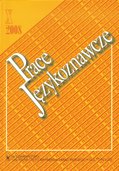Типология неизосемических реализаций
пропозиционального аргумента (на материале польского и русского языков)*. Часть 2
Typology of non-izosemic realizations of the propositional argument (based on the material of the Polish and Russian languages). Part 2
Author(s): Aleksander KiklewiczSubject(s): Theoretical Linguistics, Applied Linguistics
Published by: Wydawnictwo Uniwersytetu Warmińsko-Mazurskiego w Olsztynie
Keywords: functional syntax; syntactic derivation; syntactic representation; syntactic explicitation vs implicitation
Summary/Abstract: The subject of the article is non-izosemic syntactic realizations of propositionalarguments as components of sentence content, implicated by the lexical verb meaningin the position of predicate according to its valence predisposition. A linguistic analysisand description is based on the functional syntactic theory, especially on the explicativesyntactic theory, whose foundations were worked out by S. Karolak, as well as the Polishschool of semantic syntax. The author has identified and analysed in the aspect of functionalsyntax the following types of syntactic transformations: implication, separation(replacement), loose connection, self-empowerment, conversion, blending, restructuring,simplification (creation of compact groups), transposition and definitization. The materialis served by simple and complex sentences excerpted from the texts as well as the languagecorpora in the Polish and Russian languages; the information is sometimes referredto other languages (for example, English). Describing the full/discrete and incomplete/indiscreet syntactic representations of propositional arguments, the author takes intoaccount three aspects: meaning (semantic function), form (belonging to the grammaticalclass) and syntactic position (of the verb, of the noun, independent and others).
Journal: Prace Językoznawcze
- Issue Year: 20/2019
- Issue No: 3
- Page Range: 75-90
- Page Count: 16
- Language: Russian

